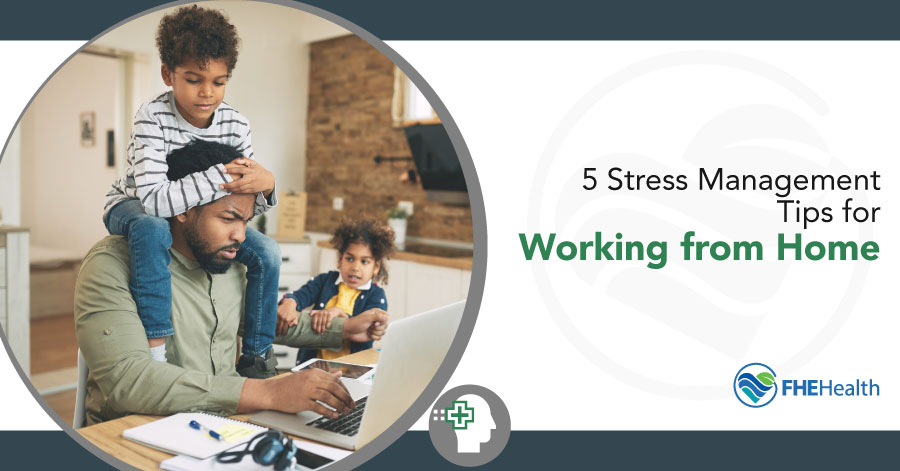
Due to the COVID-19 pandemic, much of the world has embraced telecommuting, causing many companies to create remote workforces. While working from home has many benefits, including increased flexibility, it can also add stress to your life.
If you have kids, it can be stressful trying to balance your work duties with child care and other household responsibilities. When you work from your house or apartment, it can also be difficult to separate your professional life from your personal life, leading to heightened levels of stress.
In some cases, stress is a positive thing. It motivates people to work hard and be persistent even when things don’t go exactly as planned. Too much stress, however, isn’t good for your physical or psychological health.
Persistent stress has been linked to an increased risk of heart disease, poor immune function, and digestive disorders, among other physical problems. Chronic stress can also contribute to depression, anxiety, and other mental health conditions. If working from home has caused your stress levels to increase, follow these tips to reduce the stress in your life.
1. Take Care of Your Body
You can’t respond to stressful situations effectively if you don’t take care of your physical health. Eating nutritious foods, getting regular exercise, and avoiding tobacco products are all helpful for managing stress when you work at home.
According to the UCLA Center for East-West Medicine, magnesium, complex carbohydrates, omega-3 fatty acids, and foods high in vitamin C can help reduce stress, stabilize your mood, and keep your immune system functioning properly. If you have too many stressors at home, try adding spinach, salmon, citrus fruits, and walnuts to your diet.
In a study published in Frontiers in Physiology, researchers revealed that regular exercise improves emotional resilience in adults without any major health problems. As part of the study, they had regular exercisers, and those who didn’t exercise regularly took a social stress test.
Although both groups had similar physical responses, the individuals who didn’t exercise regularly experienced a greater decline in their positive affect after completing the test. This indicates that exercise is beneficial for managing stress and elevating your mood.
2. Eliminate or Reduce Your Stress Triggers
Working at home exposes you to a variety of stress triggers, some of which you can control and others that can’t be eliminated. One of the most common triggers is an environment that makes it difficult to concentrate on your work. If this applies to you, take steps to reduce interruptions and make your work environment as comfortable as possible.
If you’ve been dealing with frequent interruptions from your spouse, children, or other family members, talk to them and explain that you can’t be interrupted while you’re working unless there’s an emergency. Turn off the ringer on your home or mobile phone to prevent interruptions from telemarketers and friends who want to chat during the day.
A noisy work environment also produces stress, especially if you’re the type of person who can’t seem to get things done unless you can work in silence. If you live in a noisy neighborhood, try covering the windows in your work area with thick curtains to block out the noise. Wearing noise-canceling headphones can also help you block out noise from leaky faucets, dripping pipes, noisy pets, and the traffic outside your window.
3. Set Boundaries With Others
If you have too much working-from-home stress, you may have to start setting boundaries with others. In some cases, working at home forces you to juggle your professional life with child care, cooking, cleaning, caring for elderly parents, and many other responsibilities. You can’t possibly do everything by yourself, so don’t be afraid to set limits and ask your family members for help when needed.
People who’ve never worked from home before may assume you can take breaks whenever you want, leading them to ask you for help when you’re supposed to be working. Explain that you need to treat working from home just as seriously as working in an office, and you can’t take time away from work to help them. If this doesn’t work the first time, turn down subsequent requests kindly but firmly.
4. Meditate Regularly
Meditation is helpful for managing stress and has even been shown to improve outcomes in people with depression, anxiety, and other mental health conditions. In a review of 36 trials designed to test the effects of meditation, 69.4% showed that participants who meditated had better outcomes in terms of their anxiety symptoms than those who didn’t meditate.
To reduce stress with meditation, follow these steps:
- Sit down in a quiet place that’s free from distractions.
- Focus on your breathing. Listen to the sounds you make when you inhale and exhale.
- If you start thinking about something else, redirect your attention to your breathing.
- When you finish, think about how you feel. Note whether you feel calmer, less stressed, and ready to tackle your next task.
5. Listen to Music
If you have too much stress working from home, listening to relaxing music is an easy and inexpensive way to stay focused. Using your favorite streaming service, look for quiet music with slower tempos. Debussy’s “Clair de Lune” and Chopin’s Nocturnes are excellent examples of classical music that can help you relax and unwind.
Nature sounds are also a welcome addition to any high-stress environment. Look for compilations featuring babbling brooks, thunder, rushing streams, and heavy rains. If you find these sounds distracting, look for musical compositions featuring the flute, the harp, or other instruments known for producing relaxing sounds.
If stress associated with working from home has become unmanageable, it’s time to seek professional help. FHE Health has experienced staff members on hand to help you identify your stress triggers and learn how to manage stress in a healthy way. Contact us at (833) 596-3502 to learn more about how we can help.






